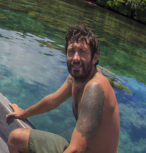DNA reveals the past and future of coral reefs
New DNA techniques are being used to understand how coral reacted to the end of the last ice age in order to better predict how they will cope with current changes to the climate. James Cook Univer

From 2005 to 2022, the main node of the ARC Centre of Excellence for Coral Reef Studies was headquartered at James Cook University in Townsville, Queensland (Australia)








Abstract: The effectiveness of governance depends on its fit with the social and ecological processes to be governed. As many small-scale fisheries management operate at relatively restricted spatial scales, it is prudent to govern their use at similar scales. This recognition has led to a proliferation of community-based fisheries management – involving over 500 communities across 17 countries in the South Pacific alone. However, there is legitimate concern that these spatially limited scales of governance cannot be reconciled with the scale of key ecological processes. This is of particular concern for large coral reef fishes which migrate to aggregations to spawn. For many such species though, the spatial scales of key ecological processes throughout their life-cycles remain unknown, particularly in the context of the fisheries that exploit them, and their relevant governance institutions. Throughout this research I investigated the scales of governance and operation of a small-scale artisanal fishery in Papua New Guinea. Further, I investigated the scales of key ecological processes throughout the life-histories of two species of grouper, Epinephelus fuscoguttatus and E. polyphekadion – using a combination of acoustic telemetry, age-based demographics, reproductive biology and habitat suitability mapping. In addition to providing vital life-history information for these important, and vulnerable fisheries-targeted species, this research provides recommendations for the effective governance of coral reef fishes at scales congruous with community-based management.
Biography: Peter became interested in coral reef ecology when he realised it held the opportunity for perpetual tropical holidaying. He is a keen diver, spearo and fisherman. He completed a Bachelor of Marine Studies at The University of Queensland in 2009, including an honours project investigating the impact of cleaner wrasse on client fish assemblages at Lizard Island. Since then he has endeavoured to spend as much time as possible in the water. In 2012, Peter commenced his PhD candidature under the supervision of Glenn Almany, Josh Cinner, Richard Hamilton and John Pandolfi. His work is focused on commercially important grouper spawning aggregations in Papua New Guinea. He is passionate about conserving both cultures and ecosystems – integrating contemporary management programs into existing customary governance systems.
New DNA techniques are being used to understand how coral reacted to the end of the last ice age in order to better predict how they will cope with current changes to the climate. James Cook Univer
A new study on the effects of climate change in five tropical countries has found fisheries are in more trouble than agriculture, and poor people are in the most danger. Distinguished Profess
James Cook University researchers have found brightly coloured fish are becoming increasingly rare as coral declines, with the phenomenon likely to get worse in the future. Christopher Hemingson, a
Researchers working with stakeholders in the Great Barrier Reef region have come up with ideas on how groups responsible for looking after the reef can operate more effectively when the next bleaching
Abstract: As marine species adapt to climate change, their heat tolerance will likely be under strong selection. Individual variation in heat tolerance and its heritability underpin the potential fo
Abstract: The Reef Ecology Lab in KAUST’s Red Sea Research Center explores many aspects of movement ecology of marine organisms, ranging from adult migrations to intergenerational larval dispersal
Abstract: Macroalgal meadows are a prominent, yet often maligned component of the tropical seascape. Our work at Ningaloo reef in WA demonstrate that canopy forming macroalgae provide habitat for ad
Abstract: Sharks are generally perceived as strong and fearsome animals. With fossils dating back at least 420 million years, sharks are not only majestic top predators but they also outlived dinosa
Abstract: Connectivity plays a vital role in many ecosystems through its effects on fundamental ecological and evolutionary processes. Its consequences for populations and metapopulations have been
Abstract: Evolution of many eukaryotic organisms is affected by interactions with microbes. Microbial symbioses can ultimately reflect host’s diet, habitat range, and even body shape. However, how
Abstract: The past few years have seen unprecedented coral bleaching and mortality on the Great Barrier Reef (GBR) but the consequences of this on biodiversity are not yet known. This talk will expl